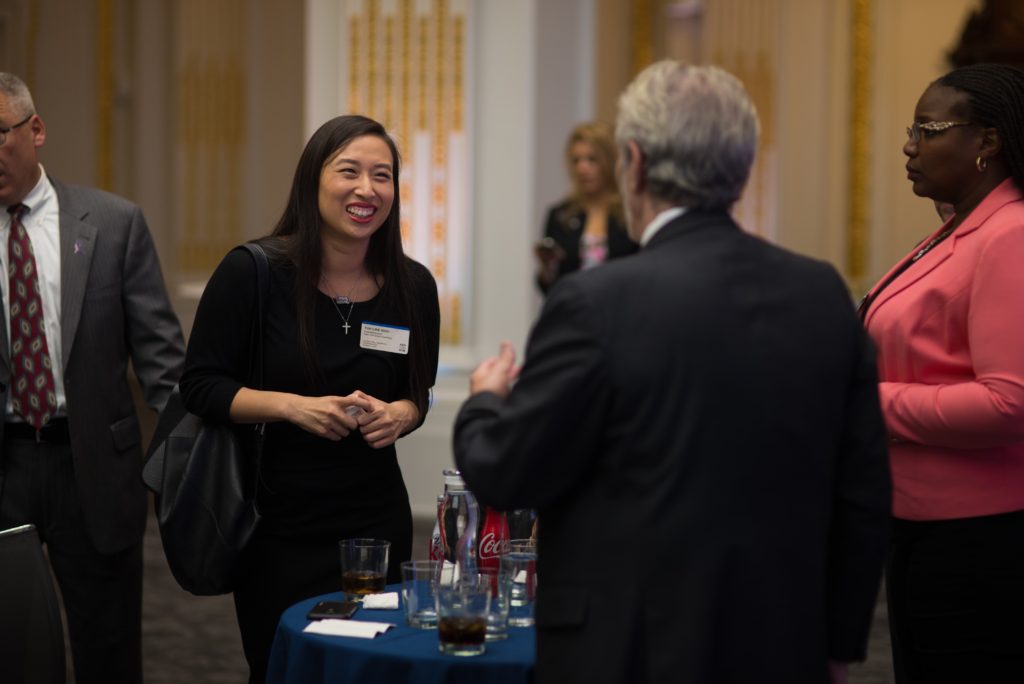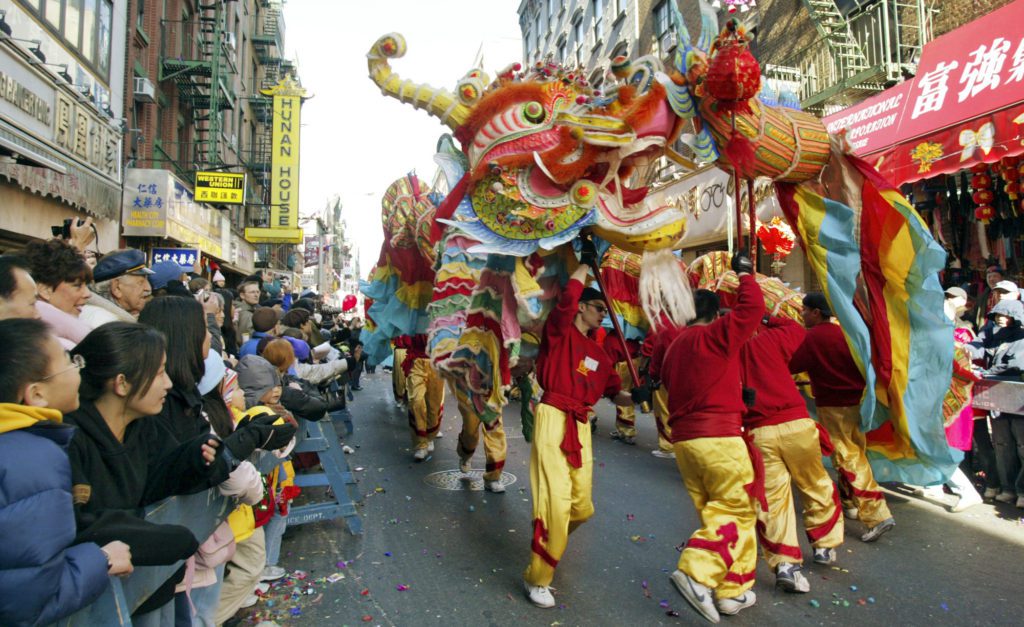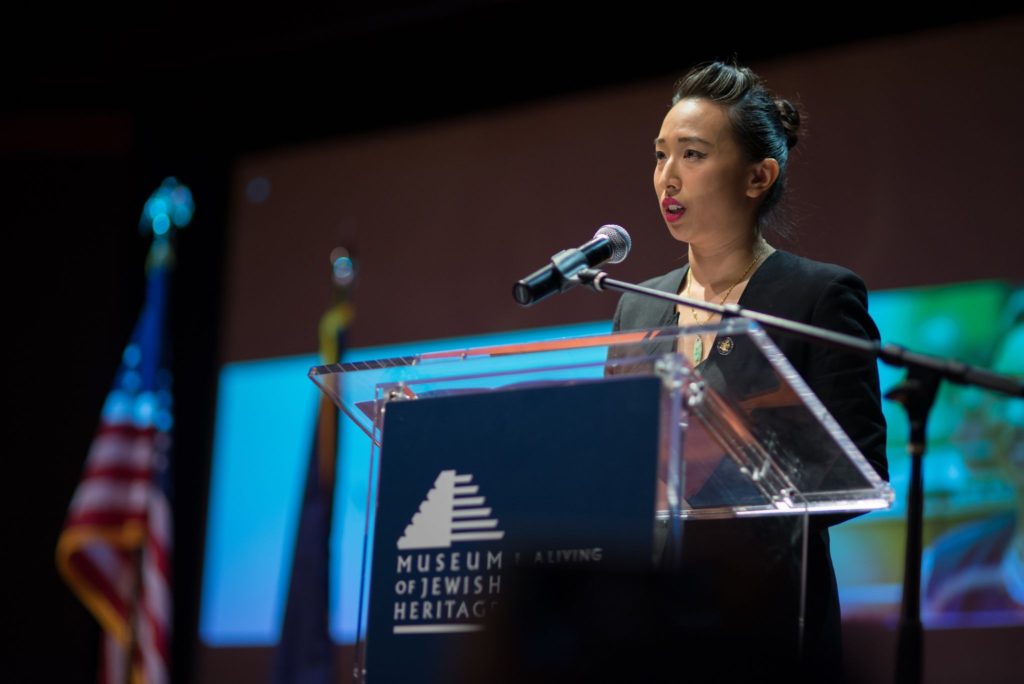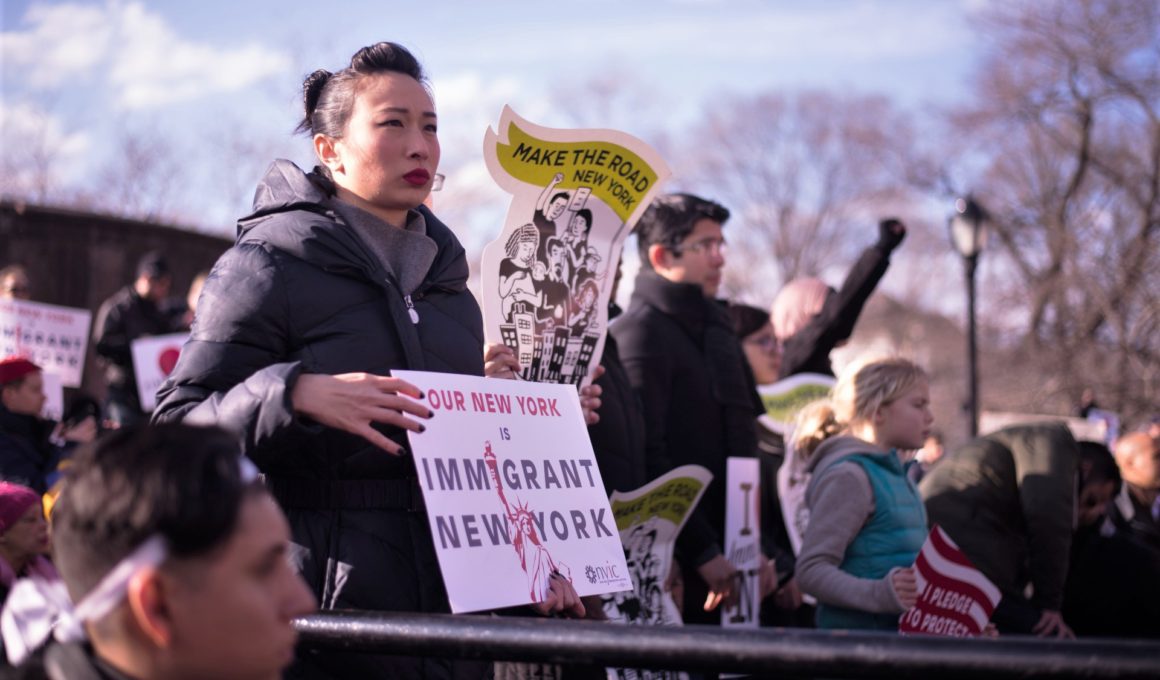Welcome to the third installment of The Yappie’s new series featuring Asian American Pacific Islander (AAPI) newsmakers, rising candidates, and lawmakers. If you’re interested in being featured, please email [email protected].
New York Assemblymember Yuh-Line Niou and I first connected on Twitter in August. She had tweeted a New York Daily News story on NYC Mayor Bill de Blasio, who walked away from a Chinatown bakery manager as the latter was in the middle of talking. Later, de Blasio said, “Nowadays, everyone wants to be offended by everything.”
“Wow…this is not it,” she wrote. “@NYCMayor ….this is your response?!”
I retweeted her with a quote from the article, which she then retweeted with a sad face emoji.
So I did what any other reporter would do. I slid into her DMs.
Yuh-Line Niou is one of those names that lurks on the edge of your consciousness—it sounds familiar, but you can’t quite recall why. You might have seen her in a public service announcement (PSA) about the Child Victims Act. You might have seen coverage describing her as one among a new wave of young women and people of color unwilling to play by Albany’s traditional rules. Maybe you read that a senior adviser to Gov. Andrew M. Cuomo (D) called her and two other women lawmakers “fucking idiots.” Or perhaps you picked up on her engagement with constituents on Twitter—usually a flurry of tweets and retweets from her account throughout the day.
Niou has made a name for herself in New York as someone who isn’t afraid to call things out. A representative of Lower Manhattan, she often comes out swinging against her own party, to party leaders’ disgruntlement.
But her reputation has reaped rewards, too. Earlier this year, she became one of five incumbent Assembly members endorsed by Rep. Alexandria Ocasio-Cortez (D-New York). She easily defeated her challenger and floated to a second term, earning Sens. Elizabeth Warren (D-Massachusetts) and Bernie Sanders’ (D-Vermont) endorsements along the way. Grassroots organizers, especially those advocating for the working class and people of color, have said it’s “unconscionable to not fully support Yuh-Line Niou, one of the most active fighters for our communities’ needs.”
Her tagline, as she told City & State New York last year, is: “I’m maybe more left than left.”
When faced with her record as a champion for the marginalized, it’s easy to forget that Niou has had to break into politics largely on her own without a playbook. She is one of two Asian Americans in the Assembly—and the only Asian American woman in state legislature. Before her, only two Asian American women had ever been elected to state-level office, according to POLITICO.


She often pays tribute to a close relationship with Assemblymember Ron Kim and has formed fruitful relationships with other women in the legislature, but it hasn’t been easy. Her identity as an Asian American woman makes her a target for racialized and gendered harassment—such as one comment on her Facebook feed that said “Asian politicians suck Black cock.”
She is constantly enduring microaggressions—one colleague once mistook her for Rep. Grace Meng (D-New York). The stereotype of Asian women as submissive and meek means she has to double her efforts to be heard. She has to fight harder to be taken seriously—for her peers to actually absorb her words.
When we spoke last month—first attempted on Zoom and then over the phone—it was clear that her identities have played a large role in shaping her worldview and values. She is a Taiwanese American born to immigrants. She is a woman, one among millions of sexual abuse survivors. And she is on the autism spectrum.
Even though she has experienced abuse for every one of her identities, she leans into them in her everyday work. And it makes her a stronger politician, one who wields her power and potential to advocate fiercely for her constituents.
Growing up the outsider
Niou was born in Taipei, Taiwan. Six months later, her parents squirreled her to the U.S., first to Idaho, then Texas and later Washington state. Growing up, she was an observer. She saw the way other people treated her parents, and that profoundly shaped who she became.
Perhaps unsurprisingly, she was often the only Asian in the school district. Other kids bullied her because they’d never seen an Asian girl before. She was also targeted as someone on the spectrum. “The little things kind of added up a lot for me as time went on,” she said.
Kids tried to set her on fire. Others pulled her into the coat closet and spat on her. They said “horrible, messed up things” about Niou, her family, and her heritage. They made fun of the way she looked and smelled.
“So that was my childhood,” she said with a hint of irony.
Without an outlet for her pain, a young and upset Niou lashed out at her parents. She still vividly remembers the time she told her mother, “Mom, I have no friends, and everybody hates me, and it's because I'm Chinese. Why did you have to make me Chinese?”
The heartbreak on her mother’s face—the shock, the helplessness—will stay with Niou forever. “Swallow[ing] your tears” and “accepting that racism is the status quo” was what her parents taught her growing up. It was the first time her mother had to confront her own limits in protecting Niou.
Asian American parents often tell their kids they have to work twice as hard to be seen as equal. As an Asian, they have to be more careful. As an Asian, they are allowed certain behaviors and not others. As an Asian, they need to keep their heads down. That’s a set of rules people of color have to contend with. But without being able to talk explicitly about racism’s pernicious effects, young Asian Americans can only direct it inwards.
As protests over the death of George Floyd continue to roil America, Asian Americans have begun confronting anti-Blackness in their community. Part of that means making space for young Asian Americans to engage in dialogue with their immigrant parents—many of whom had to follow the “keep your head down” principle to survive when first in America.
Niou, too, is having similar conversations. Her mother, like many Asian American immigrants, doesn’t believe race factors into some of the “bad things” that happened to them. To her, they just had to work harder—a principle carried on the bedrock of the promised American Dream.
“I’ll say, ‘…Ooookay,’” Niou chuckled. “‘Tell me more about that, Mom … You tell me what your memory is, and [I’ll say] why I think of it this way and why it is we disagree on that.
“And let’s talk about it.”
‘The personal is political’
Maintaining the status quo became near impossible when Niou was sexually assaulted by a teacher as a 13 year old. She still remembers her parents’ reaction.
“It was such a weird… I was like, really? Like, just what? Don't rock the boat?” Niou recalled. “It was such a startling moment for me.”
It was hurtful, too. Her parents’ comments forced a rift in their relationship for a long time. But Niou was quick to explain her parents’ perspective as we spoke.
“I think that they really, truly didn't understand, and they were afraid, and they were ashamed,” Niou said. “They were afraid that I wouldn’t be okay, and that was their way of protecting me that made them try to be like, ‘Oh, yeah, no, let's just treat everything like it's normal. And she's fine. She's clean.’”
She didn’t speak about what happened for years. It was why she didn’t expect it herself when she stood up on the Assembly floor in January 2019 and divulged her experience to her colleagues in a discussion on the Child Victims Act, which would extend the statute of limitations for child sex abuse survivors to seek legal action.
“I was 13 years old, and it was a teacher, and I can still smell him,” she said, trembling. She cried through much of her speech.
It was an emotionally charged space as she shared her story, becoming one of four women lawmakers who would speak about their history as victims of child sexual abuse that day. For Niou, the decision was made when some Republican men claimed the legislation was intended to bankrupt institutions.
“I was just like, ‘This isn't about any institution, and you should stop thinking about it that way,’ and I just had to say that out loud,” she told me. “I had to say that to them, … ‘This isn't about that. This is about protecting kids.’ And as a kid that wasn't protected, this is what I had to say about it, you know? Because the system doesn’t make it safe for you.”
The bill passed nearly unanimously, 130-3.
Studies have shown that people who are sexually abused as children take their entire lifetimes to process their experience. It takes an average of 24 years for survivors of childhood sex abuse to verbalize it to someone else.
“So when you think about it, that’s…”—a hushed pause—“That’s crazy. And yet, we're not willing to extend the statute of limitations … It was so hurtful and painful to think about [because] I don't think anybody ever gets over that kind of stuff.
“So it’s not even like, ‘Oh, have you had time to heal?’ That’s something that just sticks with you. It’s every single moment of my life; I have to live with it. It affects every decision I make. It affects every single person I date, every relationship that I have, it affects my relationship with my parents, it affects my relationship with my siblings, it affects the way that I am able to even talk to my partner … It's everything.”
It’s clear Niou is more at ease talking about her experience these days, but she struggled with suicidality for a time. Being able to funnel her energy into helping other people in the same position has given her space to process over the years.
The first thing that popped into her head after Niou finished speaking, though, was: “My parents are going to kill me.”
“And I’m a 37-year-old woman,” she told me wryly.
Last year, Niou and the three other Democratic women lawmakers—State Sen. Alessandra Biaggi, Assemblymember Rodneyse Bichotte, and Assemblymember Catalina Cruz—who spoke that day in January filmed a public service announcement with Safe Horizon, a nonprofit that advocates for victims of violence and abuse. Niou filmed a version in Mandarin, too. Her face is now immortalized in the PSA and accompanying ads, which ask, “Are you a survivor of childhood sexual abuse like me?”
In August 2019, she stood in Times Square, one of the world’s most famous locations, surrounded by summer heat, and linked arms with Bichotte and Biaggi, who were also present for the joint announcement broadcast. They watched together as the PSA played across the screens. Niou was alone no longer.
Accessing power in government
For someone who cares so passionately about her constituents, it’s surprising Niou never considered becoming an elected official.
Watching her parents’ experience of America—one filled with mistreatment—a young Niou was determined to know how politics worked. She needed to know the system so she could break it. “This system is horrible, and that was significant for my thought process,” she said. “That’s why I became a legislative intern, … to understand how the system looks and works from a bird’s eye view.”
The directness of her intent—to know the system in order to break it—follows the kind of cause-and-effect logic she has carried throughout her life. Much of that, she says, is attributed to her being on the spectrum.
“When I was a kid, I would wonder, ‘Why does that kid have so many friends? Why is it that when they talk like this, they get that result?’” she told Refinery29 earlier this year. “It was like going down a million roads. That's how my brain works, and it works like that on policy, too.”
Her goal is to create systemic change, she told me, but she was always most comfortable behind the scenes. After graduating from Evergreen State College, she joined the Washington state legislature as a legislative aide and then switched to working for an anti-poverty advocacy group, where she focused on predatory lending that targeted communities of color and low-income areas. She also worked as a karaoke hostess and turned the daytime stripper mix at the now-defunct Lusty Lady into the country’s first unionized and worker-run co-operative strip club, according to Refinery29.
In 2010, she arrived in NYC to pursue a master of public administration at the City University of New York’s Baruch College. She made herself at home in the Big Apple, chatting up customers as a bartender at Winnie’s, a popular Chinatown karaoke bar. Soon, she was running in bigger circles. At an Asian Americans for Equality conference, Niou met Assemblymember Ron Kim, who was impressed with her credentials and soon after recruited her to run his re-election campaign in Flushing, Queens.
When Kim was re-elected, Niou became his chief of staff and spent four years in a Democratic Assembly and Republican State Senate. Then, in 2015, Assemblymember Sheldon Silver was ousted on charges of corruption and extortion. Soon enough, she was recruited to run for his seat as a candidate of the Working Families Party.
“I never thought I would be elected,” she said. The idea was inconceivable.
But that’s what happened. Though she lost a special election to a Silver ally, she ran again in the regular 2016 election with New York City Comptroller Scott Stringer’s support. In September that year, she won the Democratic nomination and emerged victor two months later, taking 67% of the general election vote and becoming the first Asian American person to represent the district, which includes Chinatown and is nearly 40% Asian American.
It was a monumental moment.


| K00019: Commemorating the Centennial of the Korean Independence Movement on March 1, 2019 |
| K00439: Memorializing Governor Andrew M. Cuomo to proclaim May 22, 2019, as Taiwan Heritage Day in the State of New York |
| Source: BillTrack50 (2019-2020 Assembly Session) |
| Since 2016, Niou has attacked the system from a variety of angles |
|---|
| A09032: Enacts the student suicide prevention act |
| A04737: Establishes the office of the advocate for people with disabilities |
| A07083: Relates to increased protections for protected classes and special protections for employees who have been sexually harassed |
| A10255: Establishes a COVID-19 emergency small landlord assistance fund |
| A10936: Establishes the COVID-19 small business recovery lease act of 2020 |
| A09784: Relates to allowing the possession and sale of electronic dart guns and electronic stun guns for self-defense |
| A08281: Enacts the Housing Stability and Tenant Protection Act of 2019 |
| A02749: Prohibits the use of unmarked police vehicles, concealed identity police vehicles and undercover police officers for routine traffic enforcement |
| A06690: Establishes a commission to be known as the New York State Temporary Commission on the Threat of Rising Oceans |
| A06606: Penalizes the price gouging of pharmaceuticals |
| A06259: Ensures that individuals enrolled in the federal DACA program are eligible to participate in the New York state excelsior scholarship program |
| A05262: Establishes the low carbon fuel standard of 2019; such standard is intended to reduce carbon intensity from the on-road transportation sector by 20% by 2030 |
| A04615: Prohibits police officers from using racial and ethnic profiling |
| A00118: Relates to women's health in correctional facilities |
| A09748: Relates to imposing a tax of one-half of one percent on all corporate stock buybacks of issued shares. |
| Source: BillTrack50 |
The significance of her election is more felt than ever in 2020. For her district’s Asian American population, many of whom are elderly and at higher risk of infection, Niou’s work on the frontlines has been critical. She and her staff personally make calls to her constituents every day to check in and often organize meal delivery. She has asked her family in Taiwan, Shanghai, and Hong Kong to send her masks so she can provide protective equipment to residents in need. Her team has handed out nearly a million masks to community members.
She told news outlets earlier this year that she was putting off formal fundraising to focus on her constituents.
Her own folding chair
Four years in a legislative chamber hasn’t diminished the glint in Niou’s eyes. When I bring up young activists who have given up on changing the system from the inside, she says she used to be that person, too. But there is no big secret to accessing government, according to Niou.
“What it is, is that there's a lot of people who are in power in it right now that don't want other people to know that it’s something they can totally access and change,” she said. “The change has to be made outside and inside; it has to be a coordinated effort to be able to make sure we can see the change that we want from the outside and affect how it is on the inside.”
She cites Shirley Chisholm—for whom she expresses her love in a number of interviews—as somebody who changed how government could look and operate. Chisholm, the first Black woman elected to Congress, famously said, “If they don't give you a seat at the table, bring a folding chair.”
It’s important to sit at the table because you can’t change the table setting—the rules—unless you’re there, Niou says; that’s why Americans need to exercise their rights. “People actually fought for these rights,” she told me, impassioned. “There were blood, sweat, and tears in the effort to make sure we have the right to vote and that we have the right to participate in government.”
The reality is that the Asian American vote is only a little over 50 years old, and it came after decades of exclusion—written into law in the Chinese Exclusion Act and later the Immigration Act of 1917. Voter suppression tactics still target Asian Americans today.
“So when you think about that … it's a very different taste, right?” Niou said. “Because you’re like, wow, things have changed. And the ability to vote and participate is in itself so critical and so radical that if we don't do it, then we’re the ones that are messing up and not appreciating the things that came before us and the people who fought before us.”


Eating bitter
Niou is resilient, there’s no doubt about it. And for a young Asian American woman like myself, who never saw my face reflected in politics growing up, Niou’s career trajectory and high-profile activism are reasons to celebrate.
But it doesn’t mean she’s not tired.
Niou, as she has noted before to media outlets, is used to harassment. That comes with the job, like it or not. But because of her gender and race, she bears additional burdens.
The other day, she was sitting down to eat at lunch. As everyone exchanged pleasantries, a man sat down and said, “Hi Assemblywoman, you got really fat.”
She laughed as she finished recalling the incident. “Like, what the f-?”
Mostly, she’s unbothered. People will say all kinds of stuff, she tells me, and she can’t make everyone happy. She can only offer up who she is, take or leave.
“If they don't want me anymore to represent them, then that’s the way it is,” she said. “But if they do, then I'm just going to be who I am, you know? And this is who I am.”
It doesn’t escape my notice that throughout our conversation, she is quick to explain the other side whenever she voices her feelings—whether the opposing point of view is her parents’, peers’, or constituents’. When I point this out to her, she says part of it stems from being on the spectrum. Just because she clearly sees the cause and effect doesn’t always mean others see it the same way. That enables her to understand the nuances of perspective.
“Maybe it’s because I overthink a lot, like as a person,” she said, bursting into laughter. “But I try to think: where did that come from?”
That lens is perhaps what the country needs more than ever now that politics has become so polarized. It also means she leans into her detractors rather than away.
“People are part of the whole ‘I hate Yuh-Line’ team just so easily,” she said. “And that's fine. I just think it’s really funny. But at the same time, I want to know their perspective, too. They have reasons to dislike me, … to have a different opinion than me and that’s okay. But I always will hear them out. It doesn’t matter how much they won’t hear me out.”
Despite the enormity of the task ahead of her, Niou tells me sheepishly she doesn’t do any of the things she knows is good for her—therapy, self-care, etc. She knows that’s not great, either.
“I’m very awful at it,” she said bluntly.
But—and here she asks if I’m Chinese by any chance. When I respond in the affirmative, she code-switches: “It’s like—我很习惯吃苦.”
Google Translate returns this phrase as: “I am very used to suffering.” Its literal translation is more layered: “I am very used to eating bitter.”
In Chinese, “eating bitter” is a maxim for enduring suffering. And Niou has eaten bitter for far too long—she’s used to it. “I don't even know what sweet tastes like,” she said.
(She adds as an aside, “I don’t know how to better put it but like, Chinese is so easy—all your feels, you know?” Cue shared laughter.)
She does sound weary when I ask about voters in her district who faced barriers to submitting ballots last month. “We’re working on it,” she said. “I just don’t know if they're going to get what they hope to out of all this. I don't know if they're going to be successful because this system is so messy.”
But she is singularly focused on recovery post-election, no matter who wins. If President Donald Trump is re-elected, she said, they won’t receive the resources they need, so states will have to “pony up” even more. Either way, fiscal responsibility is key, especially as the 40% of her constituents who are Asian American face the task of recuperating from both economic collapse and anti-Asian hate. It’s personal for her, too.
This month, she is mobilizing voters to fill out the census and cast ballots for the Working Families Party. The party has to collect at least 130,000 votes or 2% of the total vote, whichever is higher, in November’s election if it is to retain its automatic ballot line in New York. The rules requiring such are backed by Cuomo. Her Twitter feed is a stream of retweets encouraging voters to get the word out.
The grind never ends.
But maybe eating bitter, for Niou, can become sweet after all.









